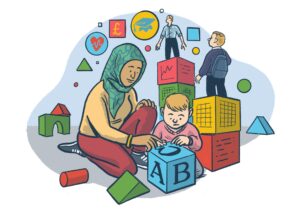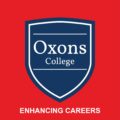Courses for Early Years Educators
Delve deep into the stages of child language acquisition. Know the compliances of interacting with children. Mastering the effective techniques of teaching early learners.
Oxons College has set out to establish itself as one of the leading organisations in the country administering English programmes for different ages, walks, occupations and professions. The college has developed extensive and intensive resources, curriculums and syllabuses tailor-made course designs to administer in classroom settings. The lessons are not limited to the 4 walls of the classrooms. Every course is coordinated with the relevant setting and expertise. For instance, the learners of Early Years Educators will have part of their learning experiences in the teaching-learning setting. Likewise, in a football club or playground for the learners of English for Sportspersons. We’ve achieved this thanks to our experience and knowledge of the sector, and through working with some of the leading experts in the field. Research of world-leading scholars in the field of ESP (English for Special Purpose) has been thoroughly studied and has been utilised in connection with the field experience of the subject field.
Every course is coordinated with the relevant setting and expertise. For instance, the learners of Early Years Educators will have part of their learning experiences in the teaching-learning setting. Likewise, in a football club or playground for the learners of English for Sportspersons. We’ve achieved this thanks to our experience and knowledge of the sector, and through working with some of the leading experts in the field. Research of world-leading scholars in the field of ESP (English for Special Purpose) has been thoroughly studied and has been utilised in connection with the field experience of the subject field.
Our Early Years Educator programme encapsulates all aspects of the field. Beginning from the primary knowledge of the subject field, it enables, eg. a carer even the compliances they have to follow. They will practice the conversations they might have used with service users. The course also includes job interviews. In a nutshell, we train to learn a very practical English espoused with academic standards.
Who Is This Course For?
This comprehensive course is designed to equip aspiring early years educators with the necessary knowledge, skills, and competencies to support the holistic development of young children. Participants will explore a range of topics and practical techniques to create nurturing and stimulating learning environments.
Fees and Funding
Total payable £1249
The fee includes printed study materials and logistic supports.
Course Outline
Assessment method: Certificate based on a set standard individual assessment
Level value: CERFL 2
Guided learning hours (GLH): 250
Tangible Outcome: Proficiency in language and communication skills in the specialised field of early learners
Mode of Teaching Learning: In-Person/Online/Blended
What Does This Course Cover?
Essential for clear interaction with children, parents, and colleagues.
Developing Literacy is vital for teaching reading and writing, and fostering a lifelong love of learning
Opens up opportunities for further training, resources, and collaboration
Important for building strong relationships with parents and students
Supports the inclusion of children with diverse language backgrounds
English proficiency can open up further training and career advancement opportunities
Compulsory topics include:
child development
professional development
safeguarding children
diversity, equality and inclusion
positive behaviour and transitions
working in partnership
promoting children’s speech, language and communication
theories underpinning practice
supporting children’s activities
Where Can You Use Early Years Educator Course?
Upon completion, learners will have the knowledge and experience required to become full practitioners in early years education. Potential job roles post-completion include:
educator in day nurseries
educator in nursery schools
educator in reception classes in primary schools
pre-school worker
Course Content
Child Development and Psychology: Understanding the physical, cognitive, social, and emotional development stages of children from birth to age five.
Curriculum Planning and Implementation: Strategies for designing and delivering age-appropriate learning experiences and activities.
Health, Safety, and Nutrition: Best practices for ensuring the well-being of young children, including nutrition, hygiene, and emergency procedures.
Inclusive Education: Approaches for supporting children with diverse needs and backgrounds, including those with special educational needs.
Observation and Assessment: Techniques for monitoring children’s progress and using assessments to inform teaching practices.
Communication and Language Development: Promoting language acquisition and communication skills in young children through various methods and activities.
Family and Community Engagement: Building partnerships with families and communities to support children’s learning and development.
Professionalism and Ethics: Understanding the ethical considerations and professional standards required in early years education.
Supplementary Activities
Practical Workshops: Interactive sessions on applying theory to real-world situations.
Case Studies: Analysis and discussion of real-life scenarios.
Role-Playing: Exercises to practice communication and classroom management skills.
Why is this course important?
Foundation for Lifelong Learning: Early years education lays the groundwork for a child’s future academic and social success. Educators trained in this course will be pivotal in shaping positive learning experiences.
Holistic Development: The course emphasizes the importance of nurturing every aspect of a child’s development, ensuring they grow into well-rounded individuals.
Quality Education: Qualified educators are crucial in providing high-quality early education, which has been shown to improve long-term outcomes for children.
Inclusive and Equitable Practices: Educators will be equipped to create inclusive environments that cater to the needs of all children, promoting equity and diversity.
Building Strong Relationships: The course highlights the importance of forming strong, supportive relationships with children, families, and communities, which are essential for effective education.
Tutorial Support
Besides regular lesson times, off-lesson-hour supports are also available at an agreed-upon time.
